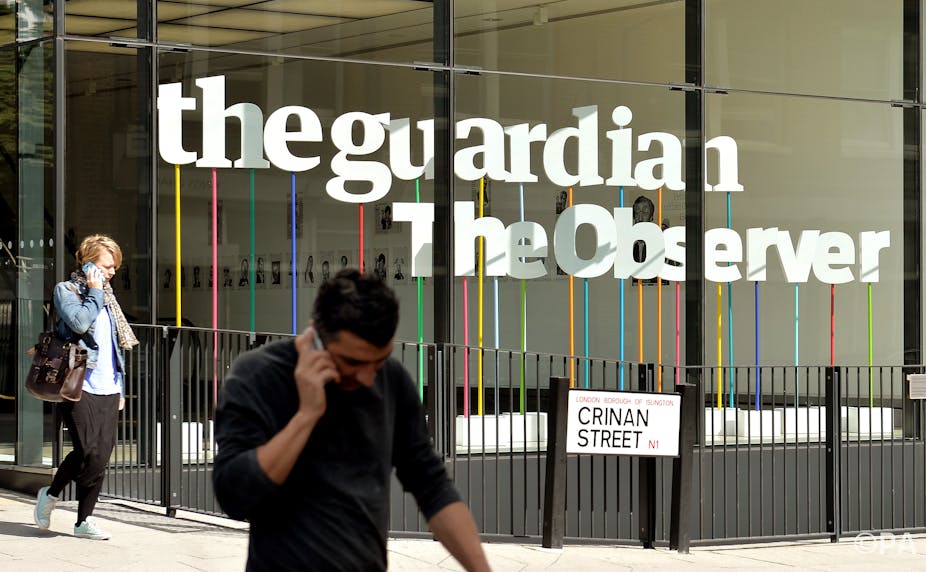More than 140,000 people have signed a petition condemning the Guardian for running an advertisement that accuses Palestinian leaders of “child sacrifice”. There is outrage but also surprise: how can a title that features the pro-Palestinian columns of writers like Owen Jones and Seamus Milne carry such an ad?
Much of our media has regularly fallen short of ethical behaviour because they are, primarily, businesses looking for any content that is likely to increase ratings and thus profit. That was the story of the cut-throat culture inside the News of the World where phone hacking was just another tool to secure exclusives and that was described so well in Nick Davies’ reports for The Guardian. Indeed the Guardian only recently condemned the use of “branded content”, in other words commercial copy, inside the hallowed pages of the op-ed section of the New York Times.
The media consists of businesses that trade in information and knowledge and so it is entirely right that we should demand changes to media ownership rules to make it harder for a few people to control so much of the public conversation. Given the levels of collusion between press barons and top politicians that was revealed during the Leveson Inquiry, controls on ownership would also encourage politicians not to be so cowed by the media’s influence.

It is a scandal that the current government is doing its best to kick this issue into the long grass – obviously desperate not to alienate powerful editors and proprietors in the run up to a general election. In the face of so much evidence about media concentration – for example, three titles control 70% of national daily circulation, one company dominates pay television and we are seeing emerging monopolies throughout the online environment – it is laughable that government’s most recent response to the problem is simply to call for regulators to “measure” concentration rather than to develop any remedies to tackle it.
But media power is not only about money. Rupert Murdoch, for example, is a hard-headed tycoon but he is also a deeply political individual committed to implementing the policies of “a woman whose name has become a synonym for liberty and strength … Margaret Thatcher”.
Unlike the Murdoch stable of newspapers, The Guardian is not motivated by a requirement to reward shareholders or to please a billionaire owner. It is run by the Scott Trust and, despite being under considerable financial pressure due to the decline in its print circulation, it is at least somewhat protected from the most direct impact of market forces.
Yet The Guardian’s attitude to Israel is contradictory. It is partly influenced by the perceived pro-Palestinian sympathies of many of its readers (thus the bylines of journalists like Jones and Milne) but it is also marked by its historic association with Zionism. C P Scott, the Guardian editor whose words adorn the Comment is Free masthead, was a firm backer of the 1917 Balfour Declaration that first talked of setting up a Jewish homeland in Palestine. In his editorial for the paper, he described the Declaration as “the fulfilment of aspiration, the signpost of destiny”.
None of this means that The Guardian is insulated from the realities of market logic. The Guardian deals with year-on-year losses by stepping up its commercial activities and also attempting to make journalists redundant. So while it is reprehensible that the Guardian chose to carry an advertisement accusing Palestinians of using children as “human shields” when the Israeli army has killed some 400 Palestinian children in Gaza, it is even more reprehensible that it would make money from doing so. That, however, is the logic of a market-driven media.
So what are the lessons we can draw from the fact that our mainstream media are predicated on an explosive mix of commercial and ideological considerations?
Despite their many significant differences, the mainstream media constitute collectively a powerful instrument for reinforcing dominant ideas. Tied to vested interests – economically and politically – it could hardly be otherwise. An unequal political system is always going to produce a media environment that, at its core, is owned and controlled by elites.
But it is also the case that the abuse of media power is increasingly viewed by audiences, if not the media themselves, as a major story in its own right. Whether it’s about the popular protests in Mexico against the anti-democratic duopoly of the two main TV channels; whether it is outrage at the appointment of Bulgaria’s leading media owner, Delian Peevski, as the head of the security services; or whether it is public disgust about the British press’s involvement in phone hacking, or the huge wave of anger against The Guardian for publishing the anti-Hamas ad, audiences are more than capable of standing up to this power.

